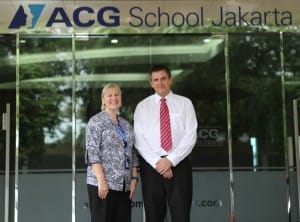Dr. Stuart Tasker is an educator who has been an expat for 12 years. In June, he will be moving from Thailand to act as the new Principal of ACG School, Jakarta, an institution with 400 students from 32 different nationalities.
Where are you originally from and how long have you been an expat?
I consider myself a New Zealander, having lived there since I was 12 and having New Zealand citizenship. But I was born in Africa and grew up in Australia and then England before moving to New Zealand; my parents are English so I also have British citizenship. As an adult, I have worked in Australia, England, Thailand (twice), Fiji and China. So as for living as an expat; it’s been about 12 years – or maybe my whole life!
In which field did you gain your doctorate degree?
My doctorate is in Education. My dissertation was an analysis on the impact of Service Learning – the benefits of meaningful community service on engagement with learning, academic achievement and personal development. It was a great experience going back to study to do my doctorate later in life. It reinforced my belief about the importance of being a life-long learner.
You’re moving to Jakarta in June to act as principal of ACG School Jakarta. How are you feeling about the move?
I will have completed four years as principal at my current school and I am ready for a new challenge. Having visited ACG School Jakarta twice now and seen the campus, the staff and of course the children, I am excited at the prospect of helping the school develop and grow.
What interested you to relocate to Indonesia from Rayong, Thailand?
I know ACG as an educational group of substance and integrity from my time in New Zealand, so this was the first key thing. Indonesia is a wonderful, busy and interesting country. The Indonesian people I have met in my life up to this point have been incredibly warm and gentle. These things made the decision quite easy in the end.
How have your experiences been so far as a Thailand expat and how do you think these will compare with being an Indonesian expat?
In Thailand life is always interesting. The people are warm-hearted, the food amazing and the lifestyle of an expat is as good as you are prepared to make it – or willing enough to adapt to. I think life in Jakarta will be ‘same-same but different’, to coin a famous Thai phrase.

What do you hope to achieve during your time at ACG School Jakarta?
ACG School Jakarta is relatively new, but is now well established as a school of quality and integrity in Jakarta. The family feel of the school is wonderful and I hope to continue to foster this wonderful spirit between the students, teachers and parents. I’m interested in seeing the senior school develop in the same way that the primary school has gone from strength to strength. I think that I have something very special to offer there
What will the first task on your agenda be when you start working at ACG Jakarta?
The first things I will do will be to look, listen and to talk to key people – students, staff and parents – to see how the school is perceived. Only then will serious thought be given to what could be done to enhance what the school is already doing so well.
What traits do you have to possess in order to be a successful and respected principal?
I would hope that others see me as calm, approachable and affable. But also totally professional and committed to the development of children and young people – this is where I sometimes can be difficult and obstinate, as I see the educational journey of each individual child as so important.
Jakarta has a large selection of international schools; what sets ACG apart from the others?
ACG School Jakarta has a definite family feel to it. The staff and parents are there to join and support the children on their learning journey. The school makes this three-way partnership rich, rewarding and enjoyable for all concerned.
What curriculum does ACG School Jakarta follow? Which do you personally prefer – IB or A Levels, and why?
ACG offers IGCSE through the University of Cambridge to students in Year 11, then the subsequent CIE A Level qualification to Year 12 and 13 students. Having these benchmark examinations is very motivating for students and their families who are often moving between countries and applying for universities all over the world. I am also a firm supporter of the International Baccalaureate as it is broad, challenging and also brings with it other valuable things such as the learner profile.
Do you believe students of international schools are more tolerant towards other cultures?
I would hope that all schools deal with such things in a similar way. It’s dubious to say that any school, or type of school, is more tolerant or understanding than another as a general statement, even in the international school world.
A school should respect all cultures, perspectives, religions and diversity. It is important for all students to see and experience understanding, tolerance and acceptance. Many international schools have the benefit of a wonderful mix of cultures, nationalities and perspectives to embrace, which would make this easier I would think.
As an educator, what do you believe is the most important thing to teach students?
To be an active part of your own learning process; to enjoy school and get out of it as much as they can. Learning (and not just academic learning) is not ‘done’ to you, it is something which should be embraced and enjoyed.
What is it like teaching students in the smartphone era? What challenges do these gadgets create at schools?
Smartphones are what they are – omnipresent and either really annoying at a school, or a wonderful potential opportunity for broadening learning opportunities. I have worked at schools where they were banned (several years ago and not really practical in today’s world) and others where they formed a key part of a BYOD (Bring Your Own Device) environment to aid learning through internet access, use of key Apps and so on. A major challenge is the ‘addiction’ or over-reliability there can be on smartphones by many young people. It’s a balancing act; we need to take the best that they have to offer and avoid the traps.
Have you ever had to deal with a student being bullied on social media? How did you handle this?
This is unavoidable in today’s society, so I have had to deal with this many times. Each instance is of course different and often with many contributing factors. Bullying in any form should be dealt with firmly and consistently, but cyber-bullying can be sinister as people’s cyber-personality is often different than their physical one.
Do you have any concerns about living in Indonesia?
Just the usual concerns as an expatriate: the happiness and well-being of my family. It is important that as a non-working spouse that my wife is happy and also that my young daughter has many wonderful experiences as she grows up in this amazing country.
What is the most challenging aspect of your job as a principal?
Everybody wants a principal to be what they expect a principal to be. An effective principal needs to be able to meet these expectations as best as possible.
If you could choose any famous actor to play you in a movie, who would it be?
Someone a bit zany – Jim Carrey or maybe Johnny Depp!
Thank you, Dr. Stuart. To get in touch, please email: [email protected]




